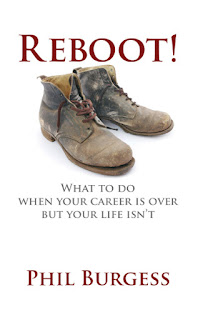Later Life Work [ as described in Phil Burgess great book: "Reboot" ]
Work comes in many flavours and for people post retirement defined in terms of obligations and accountabilities, work seems to fall into one of five categories.
 |
Phil Burgess
Authour: Reboot! |
Type 1: Paid work.
Many in later-life still work for pay, earning a salary, wages, or fees. Employees work for salaries and wages; professionals, craftspeople, consultants, and freelancers typically earn fees.
For many, paid work in later life will often mean continuing to work as a lawyer, accountant, or pharmacist but often on a reduced-time basis. For others, it may involve work totally different from earlier career-related activities.
For example, after retiring from a well paid middle management job a retiree found that after a few months in retirement, he was bored to tears. His wife felt as though someone had intruded on her home life, a place she controlled for over 40 years of their marriage. Rather than doing nothing, he took up a part-time job stacking groceries shelves at a local supermarket.
Outcome: The job provided a schedule, a chance to work with others, and an opportunity to provide a needed service. The additional income, in his case, didn’t change his standard of living but was icing on the cake, along with the restoration of a more normal relationship with his wife.
Type 2: In-kind work.
Post-careerists trade their time for in-kind benefits, such as managing a apartment complex or house-sitting in return for living quarters, serving as an usher at sporting events in return for watching the game, working on a cruise ship (e.g., as a lecturer or child-care provider) in return for passage, or providing clean-up services at a performing arts centre in return for free tickets.
In some cases, like managing an apartment complex, you are on-call 24/7 with many obligations and accountabilities. In others, such as clean-up services, there is a lot more flexibility, where you may work only two to three times a week for four to five months a year, but the activity is scheduled and obligatory and involves accountabilities to others. It is work.
Type 3: Volunteer work.
Many later-lifers “gift work" i.e., provide a benefit to another on a regular basis without pay or other consideration, usually through a non-profit organization. Volunteers may create products, such as knitting sweaters for the less-advantaged, casting pottery for sale at fund-raisers for the church, building a house for Habitat for Humanity, or manufacturing benches for a neighborhood park.
Volunteers more typically provide services, such as reception services (meeting, greeting, answering phones), helping out at church, delivering meals on wheels for a local nonprofit, coaching a youngsters sports teams, or providing free management assistance to a small-business owner or entrepreneur as a volunteer counselor.
In these cases, charities, community institutions, or other nonprofits get the benefit of your time and talent, and you get the many benefits of social engagement, especially the opportunity to use your gifts to help others and to work to repair the world or make it a better place.
Type 4: Samaritan work.
Person-to-person care-giving or assistance arranged informally is something growing numbers of later-lifers are doing for relatives, friends, or other loved ones. Samaritan work includes care-giving for infirm or frail parents, an ailing spouse, dependent neighbor or good friend – or when grandparents provide child care for grandchildren of working parents.
It also includes personal services, such as rehabilitation assistance or assisting with the activities of daily living, including food preparation, shopping, or transportation to appointments. It may be maintenance services, such as lawn care, gardening, shoveling snow for home-bound neighbors, or home maintenance assistance to later-life friends and neighbors who still live at home but can’t do the heavy lifting to maintain and repair buildings and grounds.
Type 5: Enrichment work.
Some may be surprised that enrichment is considered work. However many later-lifers take a highly disciplined approach to self-improvement.
Examples of a disciplined approach to self-improvement include training for competition (e.g., amateur tennis, club golf, or Masters swimming); enhancing, sharpening, or applying a skill (e.g., woodworking, computer publishing, photography, chess, piano); learning something new, such as a new language, a new musical instrument, a new culture,a new body of literature (e.g., Chinese history, dynamics of aging, nutrition, or the history of baseball) or joining a book-reading club; creating, as in arts or crafts (e.g., playing the guitar in a country music group, portrait or landscape painting, writing, cartooning, carving), philanthropy, or other activities “undertaken for the love of work itself.”
The important issue here is that “enrichment work” is not just messing around, pursuing a pastime, or something you do when you don’t have anything else to do. If you go out to the courts a couple of times a week just to bat the ball around or read a book now and then – that is what we call a pastime or leisure-time activity. There is nothing wrong with leisure-time activity, but it does not qualify as enrichment work. Activities qualifying as enrichment work are planned and purposeful (e.g., improving knowledge or performance, or applying skills to creating something or helping others) and involve obligating yourself to the process and making yourself accountable to someone (e.g., your spouse, partner, friend, or co-worker who knows of your commitment) who will help and encourage you to be true to your undertaking.
[ This article is inspired by the description of later life work style is the book Reboot by Phil Burgess available from Amazon as a paperback or as a kindle - it is highly recommended ]







